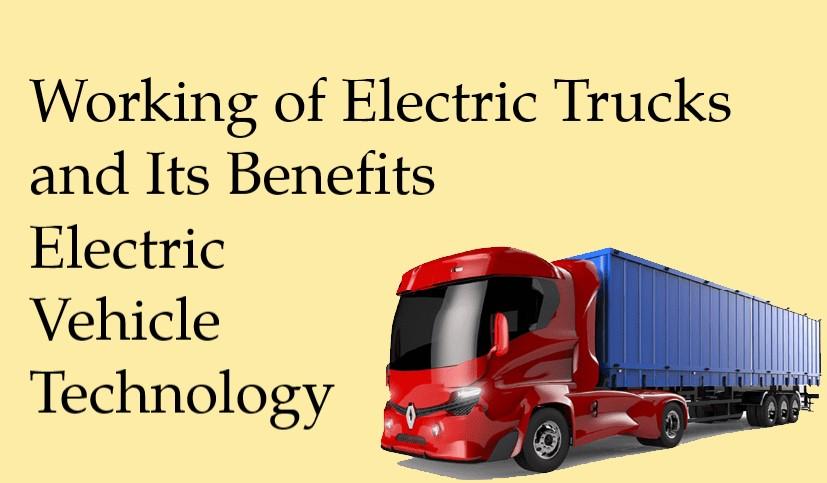What is the technology of electric vehicles?
Electric trucks are a type of vehicle that uses electricity to power its motor (EV Technology). Rather than relying on traditional fossil fuels like gasoline or diesel. Electric trucks are becoming increasingly popular as a more environmentally friendly and cost-effective alternative to traditional trucks.
The technology behind electric trucks is similar to that of electric cars, with a rechargeable battery pack that powers an electric motor. The main difference is that electric trucks require larger and more powerful batteries to be able to carry heavy loads and travel long distances. However, advances in battery technology are making it possible for electric trucks to compete with traditional trucks in terms of range and hauling capacity.
Working of Electric Trucks (EV Vehicles):
Electric trucks work by using a rechargeable battery pack to power an electric motor that drives the wheels. When the truck is in motion. The motor draws power from the battery pack to turn the wheels and move the vehicle forward.
The battery pack in an electric truck is usually located under the chassis, and it is made up of a series of individual battery cells. These cells are connected together to form a high-voltage battery pack that can deliver the power needed to move the truck.
To charge the battery pack, the truck can be plugged into a charging station or a standard electrical outlet. Depending on the size of the battery pack and the charging rate, it can take anywhere from a few hours to several days to fully charge an electric truck.
While driving, the electric truck uses regenerative braking to recharge the battery pack. When the driver applies the brakes. The electric motor reverses its direction and acts as a generator, converting the truck’s kinetic energy into electrical energy that is stored in the battery pack. This helps to extend the truck’s range and reduces the amount of time needed for charging.
One of the challenges of electric trucks is their limited range compared to traditional trucks. However, advances in battery technology are making it possible for electric trucks to travel farther on a single charge. Additionally, many companies are investing in charging infrastructure to make it easier for electric truck drivers to find charging stations on long hauls.
Overall, electric trucks offer a promising alternative to traditional trucks, with lower operating costs, reduced emissions, and quieter operation. As battery technology continues to improve. It is likely that electric trucks will become an increasingly common sight on the roads.
Electric trucks offer several benefits over traditional trucks, including:
Lower operating costs:
Electric trucks have lower fuel costs than traditional trucks, as electricity is generally cheaper than gasoline or diesel. Additionally, electric trucks require less maintenance, as they have fewer moving parts than traditional trucks.
Reduced emissions:
Electric trucks produce zero emissions while driving, making them a more environmentally friendly option than traditional trucks. This can be especially important in areas with poor air quality.
Quieter operation:
Electric trucks are quieter than traditional trucks, making them ideal for use in urban areas where noise pollution is a concern. This can also make them a better option for nighttime deliveries in residential areas.
Increased efficiency:
Electric trucks have a more efficient drivetrain than traditional trucks, which means they can travel farther on a single charge. This can help reduce delivery times and increase productivity.
Government incentives:
Many governments offer incentives for the purchase of electric trucks, such as tax credits or rebates. Which can help offset the higher upfront cost of the vehicle. This can make electric trucks a more affordable option for businesses.
Improved driver experience:
Electric trucks are often smoother and more comfortable to drive than traditional trucks. Thanks to their electric motors and lack of vibration. This can help reduce driver fatigue and make the job of driving a truck more enjoyable.
Overall, electric trucks offer a promising alternative to traditional trucks, with lower operating costs, reduced emissions, and improved driver experience. As battery technology continues to improve, it is likely that electric trucks will become an increasingly common sight on the roads.
While electric trucks offer several advantages over traditional trucks, they also have some disadvantages, including:
Higher upfront cost:
Electric trucks are currently more expensive than traditional trucks, due in part to the cost of their battery packs. This can make it difficult for some businesses to justify their investment in electric trucks.
Limited range:
Electric trucks typically have a more limited range than traditional trucks, which can make it difficult to use them for long-haul trips. However, this is improving as battery technology continues to advance.
Charging infrastructure:
The availability of charging infrastructure for electric trucks is currently limited compared to the availability of gas stations for traditional trucks. This can make it difficult to find a place to charge an electric truck during long trips.
Longer charging times:
Even with fast charging, electric trucks take longer to charge than traditional trucks take to fill up with gasoline or diesel. This can limit their productivity during busy periods.
Battery disposal:
When the battery pack in an electric truck reaches the end of its life, it must be disposed of properly to avoid environmental damage. This can be expensive and time-consuming.
Weight:
Electric trucks tend to be heavier than traditional trucks, due to the weight of the battery pack. This can limit their payload capacity and reduce their efficiency.
Overall, electric trucks are a promising technology, but they do have some limitations that need to be addressed before they can become a mainstream alternative to traditional trucks. However, as battery technology continues to improve and charging infrastructure becomes more widely available, it is likely that these disadvantages will become less significant.



1 thought on “Working of Electric Trucks|EV Technology”